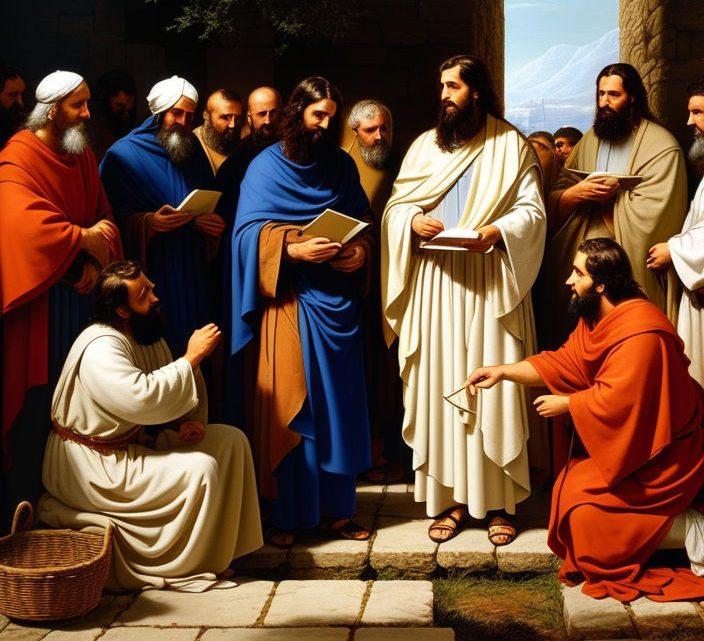The 12 Tribes of Israel: Symbols of Promises, Unity, and God’s Plan


The 12 Tribes of Israel, descended from the sons of Jacob, hold immense significance in both the historical and spiritual realms. Their formation marked the foundation of ancient Israel, and their experiences reflect the promises, unity, and fulfillment of God’s plan. Exploring the biblical narrative and relevant scriptures deepens our understanding of the profound role played by the 12 Tribes of Israel.
Formation and Inheritance: After the Israelites’ liberation from Egyptian slavery and their wilderness journey, the 12 sons of Jacob—Reuben, Simeon, Levi, Judah, Dan, Naphtali, Gad, Asher, Issachar, Zebulun, Joseph, and Benjamin—became the patriarchs of the 12 Tribes of Israel. Each tribe inherited a portion of the promised land of Canaan (Joshua 13-21). This division ensured their roles in shaping the destiny of God’s chosen people.
Historical and Religious Significance: The 12 Tribes of Israel played a pivotal role in the history and religion of ancient Israel. United by a common ancestry, they formed a confederation of clans that engaged in battles against various adversaries, as seen in the book of Judges. They worshiped Yahweh, the God of Israel, who bestowed upon them the Law and established the covenant at Mount Sinai (Exodus 19-24). These foundational events solidified their religious practices and moral framework.
Division and Kingdoms: Following the united monarchy under Saul, David, and Solomon, the 12 Tribes experienced a division into two kingdoms. The northern kingdom, Israel, comprised ten tribes, while the southern kingdom, Judah, encompassed the tribes of Judah and Benjamin. This division occurred after the reign of Solomon, and the tribes’ destinies diverged from that point.
Israel’s Exile and the Fate of the Tribes: The northern kingdom of Israel faced a tragic fate. As a result of their disobedience to God and their idolatrous practices, the Assyrians conquered them in 722 BCE. Many from the northern tribes were exiled and scattered among foreign lands, eventually assimilating into other cultures. This dispersion led to the concept of the Lost Tribes of Israel, whose exact whereabouts remain a mystery.
Judah’s Preservation and Return: In contrast to Israel, the southern kingdom of Judah endured for a longer period. Although they also faced periods of idolatry and disobedience, God’s mercy spared them for a time. However, due to their persistent rebellion, the Babylonians conquered Jerusalem in 586 BCE, leading to the Babylonian exile. Yet, a remnant of Judah eventually returned to the land of Israel after the exile, rebuilding the temple and restoring aspects of their religious practices.
Symbolism and Spiritual Significance: Beyond their historical roles, the 12 Tribes of Israel hold profound symbolism in the biblical narrative. They embody God’s promises to Abraham, Isaac, and Jacob, representing the fulfillment of His covenant. Their unity as a confederation of tribes reflects the diversity and oneness within God’s chosen people. The tribes also serve as reminders of the blessings that come from obedience and the consequences of straying from God’s ways.
Foreshadowing in Yeshua Messiah: The biblical narrative points to a deeper significance of the 12 Tribes of Israel. Yeshua Messiah, often referred to as the Lion of Judah (Revelation 5:5), is the culmination and fulfillment of God’s plan for His people. He transcends tribal distinctions and unites believers from all backgrounds, offering salvation and eternal life. Yeshua brings to fruition the promises and prophecies associated with the 12 Tribes, embodying the true spiritual identity of Israel.
Conclusion: The 12 Tribes of Israel—formed from the sons of Jacob—played a vital role in the history and spirituality of ancient Israel. Their inheritance, unity, division, exiles, and returns are interwoven with God’s promises and the unfolding of His plan. These tribes symbolize the diverse yet unified family of God, and their experiences provide profound lessons. Ultimately, they foreshadow the fulfillment found in Yeshua Messiah, who brings unity, redemption, and the true spiritual identity of Israel to all who believe.

